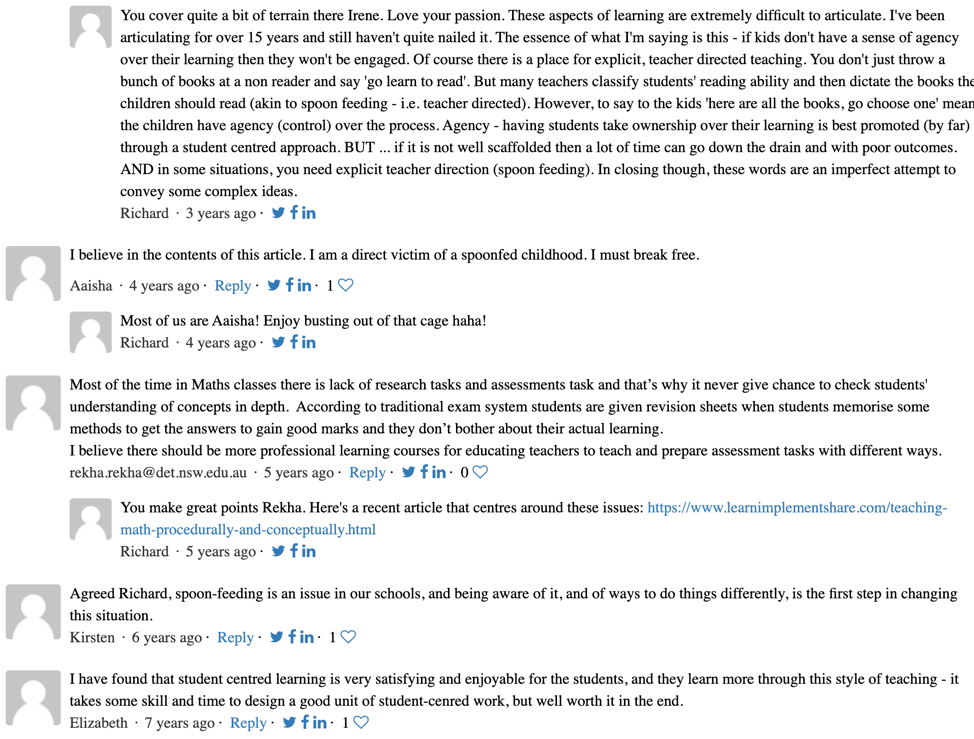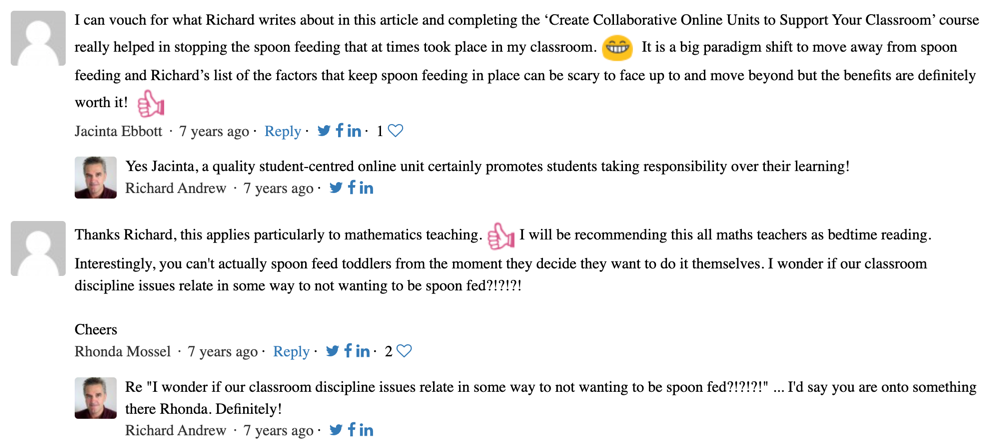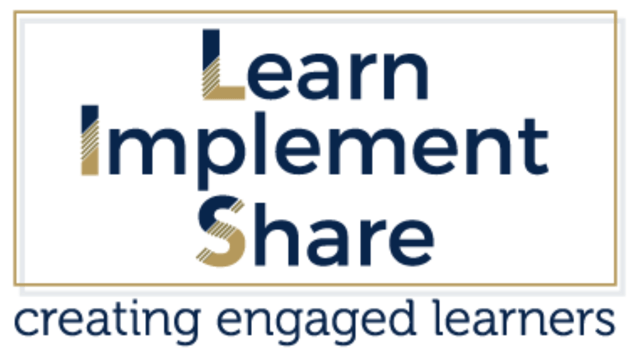Let’s Put An End To Spoon-Feeding in Education!
... And Create Self-Directed Learners
|
I wish to shine a spotlight on the education phenomenon referred to as ‘spoon-feeding’.
Far from being a research-backed article, this one springs from 20+ years of teaching, 10 years of parenthood and a great deal of thinking about these ideas over many years. The intent here is to provide some food for thought in you, the reader. I would love to see the amount of spoon-feeding in classrooms decrease around the world. |
What is spoon-feeding in education?
|
Spoon feeding education:
|
- Creates the dynamic where the teacher invests considerably greater effort into the learning process than his/her students yet with disappointingly poor outcomes.
Here's my take on spoon-feeding, and why we need to
|
Spoon-feeding and toddlers – food only please!
Note that spoon-feeding does not even apply to toddlers, except, of course, in the case of actually feeding the little joy-bundles. Parents do not teach their toddlers how to walk by spoon-feeding the information. Rather, toddlers see their bigger family members walk, they gain the desire to walk, they try and fail ‘a hundred times’ … and then they begin to walk. This is discovery learning. It is inquiry-based learning. It is mostly self-directed learning. Sure, toddlers receive assistance from the people around them but the assistance is supportive; the adults facilitate the learning. It is not spoon-feeding. They do not instruct toddlers by saying "Left foot first, now check your balance, now carefully transfer your weight ... " |
The same applies to toddlers learning how to run, skip, talk, jump, sing and pretty much everything else they learn to do before they hit school. I would argue the same also applies to reading. Assuming, that is, that the child willingly learns to read before school begins, spoon-feeding plays no part in children learning to read. Sure, parents ideally read to their children on a daily basis from age 3-weeks, but acquisition of the skill of reading occurs more by osmosis than by the parent saying ‘OK Lucas, I’m going to teach you more words.’ The parent’s true role is to fan the flame of reading enjoyment in their child. The same should apply to 'teaching' students (anything) in the classroom.
Self-directed learners are not spoon-fed!
One of the reasons self-directed learners tend to be effective learners is that they tend to engage in their learning meta cognitively. They ask questions of themselves and others and usually know what they do and do not understand. They think about their thinking as they inquire. This is clearly the opposite to spoon-fed learners because spoon-fed learners do not need to think about their learning. Everything they learn is provided to them by their teacher – what to learn, how best to learn, when to learn, how deep to learn - for each aspect including the questions likely to be encountered in the upcoming test. Spoon-feeding tends to be the domain of teacher-directed classrooms and is driven in part by the demand for high test scores.
The tide of spoon-feeding in education.
Before we see the reduction of spoon-feeding in education there are some realities which need to be faced. The practice of spoon-feeding is kept in place by several factors:
So what’s the alternative?
Plan for change. Do some research. Find out what the alternative to spoon-feeding looks like. Implementing change which includes a move away from teacher-directed learning towards a well scaffolded, student-centred approach will lay a foundation for reducing the amount of spoon-feeding. Make a plan to foster meta cognition in students. Inform students of the coming changes. Keep them ‘in the loop’, always. Explain that the changes may feel uncomfortable for a while but that in a month or two they will likely prefer the new system to the old.
The alternative sounds pretty straight forward, and in truth, once the changes have been made you will likely find it easy and rewarding, making it difficult to return to ‘the old ways’.
Nonetheless, the transition from being a spoon-feeder to a facilitator of learning is a big undertaking. The Learn Implement Share 'Engagement courses' for teachers support teachers who want their students to become engaged learners and to take responsibility for their learning. Part of that journey is to cease being a spoon-feeder and become an active facilitator of learning.
Comments anyone? Are you concerned with our addiction to spoon-feeding? (Your email address will not be required)
Self-directed learners are not spoon-fed!
One of the reasons self-directed learners tend to be effective learners is that they tend to engage in their learning meta cognitively. They ask questions of themselves and others and usually know what they do and do not understand. They think about their thinking as they inquire. This is clearly the opposite to spoon-fed learners because spoon-fed learners do not need to think about their learning. Everything they learn is provided to them by their teacher – what to learn, how best to learn, when to learn, how deep to learn - for each aspect including the questions likely to be encountered in the upcoming test. Spoon-feeding tends to be the domain of teacher-directed classrooms and is driven in part by the demand for high test scores.
The tide of spoon-feeding in education.
Before we see the reduction of spoon-feeding in education there are some realities which need to be faced. The practice of spoon-feeding is kept in place by several factors:
- Parents who complain to the school when little Jonny comes home complaining that Mr. Blogg has introduced a teaching method – a method aimed at providing learners with greater ownership of their learning. (Mr. Blogg is reducing the amount of spoon-feeding he does.) Rather than being impressed at Mr. Blogg’s initiative Jonny’s parents accuse him of ‘no longer teaching’ and fear the result will be a drop in Jonny's test scores.
- Schools who allow parents with outdated views on education to inhibit educational progress within the school.
- Teachers who find difficulty swimming against the tide of student resistance to change.
- Teachers who adhere to the mantra ‘I teach the way I teach because that’s the way I have always taught.’
- Schools, parents, teachers and students who value traditional test results more highly than understanding, problem solving and student ownership of learning.
- Assessment which assesses ONLY information which traditionally has been delivered by spoon-feeding – facts, rules and procedures – rather than (also) assessing understanding, problem solving, reasoning.
So what’s the alternative?
Plan for change. Do some research. Find out what the alternative to spoon-feeding looks like. Implementing change which includes a move away from teacher-directed learning towards a well scaffolded, student-centred approach will lay a foundation for reducing the amount of spoon-feeding. Make a plan to foster meta cognition in students. Inform students of the coming changes. Keep them ‘in the loop’, always. Explain that the changes may feel uncomfortable for a while but that in a month or two they will likely prefer the new system to the old.
The alternative sounds pretty straight forward, and in truth, once the changes have been made you will likely find it easy and rewarding, making it difficult to return to ‘the old ways’.
Nonetheless, the transition from being a spoon-feeder to a facilitator of learning is a big undertaking. The Learn Implement Share 'Engagement courses' for teachers support teachers who want their students to become engaged learners and to take responsibility for their learning. Part of that journey is to cease being a spoon-feeder and become an active facilitator of learning.
Comments anyone? Are you concerned with our addiction to spoon-feeding? (Your email address will not be required)
Subscribe to receive free tutorials, information and to stay in touch
Your turn!
Comments anyone?
NOTE: Create a Hyvor account before commenting (click LOGIN) -that way you'll be notified of replies and you won't be anonymous.
If you don't create an account, please state your name at the start of your comment. Thanks.
NOTE: Create a Hyvor account before commenting (click LOGIN) -that way you'll be notified of replies and you won't be anonymous.
If you don't create an account, please state your name at the start of your comment. Thanks.








